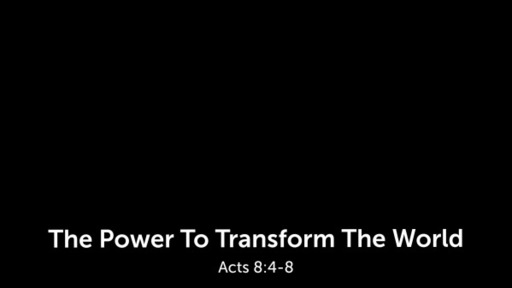The Power To Transform The World

1. Problems Provide Opportunity For Gospel Proclamation
Ordinary believers preached the word wherever they went
The term translated as “proclaim” (κηρύσσω) is often understood on the background of the task of the herald in the Greco-Roman world. The verb is related to the noun usually translated as “herald” (κῆρυξ) which denotes a person who calls out in a clear and audible manner a message that a ruler or the city magistrates have told him to convey to their constituency. The communication of a herald can be understood as “one-way communication par excellence” in which a message is conveyed that has been commissioned by a higher authority irrespective of the reception it may receive.
Luke possibly uses the traditional title because of its historic associations, which were fundamental to the hostility between Jews and Samaritans. The first century was a time of very strained relations between these two neighbours. ‘The old antithesis of North and South, of Israel and Judah, was revived in all its sharpness.
The Jewish prejudice against the Samaritans is well-known. To the Jews the Samaritans were half-breeds and heretics. Philip’s venture into a Samaritan mission was a radical step toward Stephen’s vision of a gospel free of nationalistic prejudices.
This territory near Judea was made up of those who had not left under the Assyrian exile and had intermarried with non-Jews. Jews generally looked down on Samaria; ministry here was a significant step for the church, for it indicated that old biases had no place in Christianity. For bias against the Samaritans among Jesus’s own disciples,
#1 Problems Provide Opportunity For Gospel Proclamation
2. People Are Hungry For What The Gospel Provides
The Samaritans looked for the prophet like Moses promised in Deuteronomy 18:15–19, calling him Taheb (‘restorer’) rather than an eschatological saviour and ruler from the line of David
People Are Hungry For What The Gospel Provides
People Are Hungry For What The Gospel Provides
3. The Gospel Can Transform Communities
The gospel is the great equalizer. In the gospel there are no “half-breeds,” no physical rejects, no place for any human prejudices. There is acceptance for all, joy for all, “great joy for all the people”
The Gospel Can Transform Communities
This episode illustrates the gospel’s continued expansion despite opposition and its power to break down ethnic and religious barriers. The Jews hated the Samaritans as a half-breed race and as heretics, but for Luke they are examples of outsiders for whom the gospel is good news (cf. Luke 9:52–56; 10:25–37; 17:11–19). Here they function as a mediating people between Jews and Gentiles and thus a natural step in the gospel’s gradual spread from Jerusalem to the ends of the earth (1:8).
The Holy Spirit is in the business of turning negatives into positives, of taking disasters and turning them into miracles. You can’t blockade the Holy Spirit. He likes to take those kind of tragedies and turn them into victory.